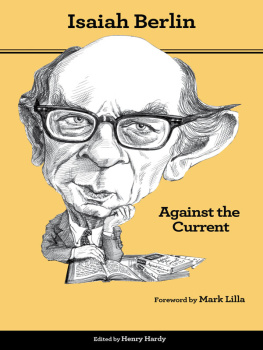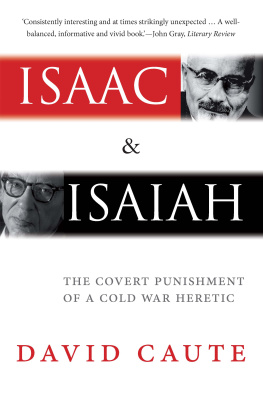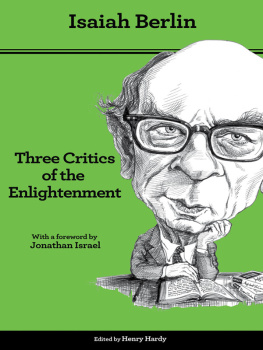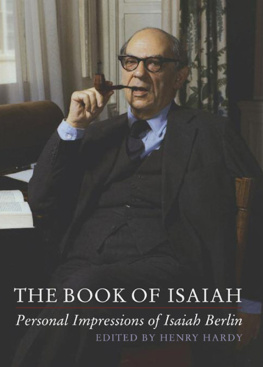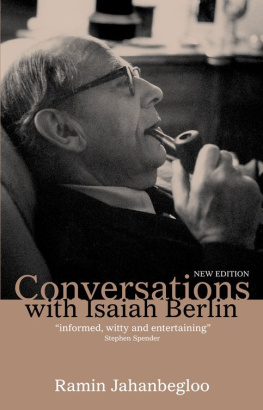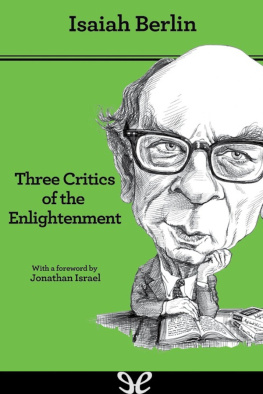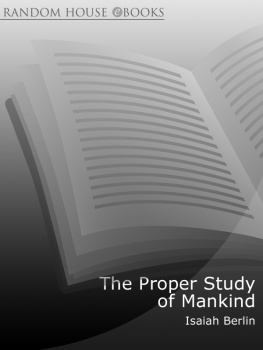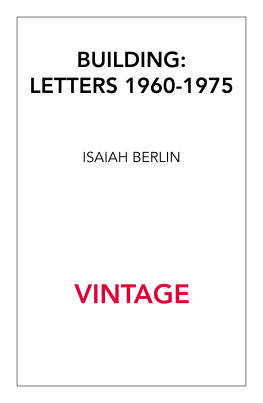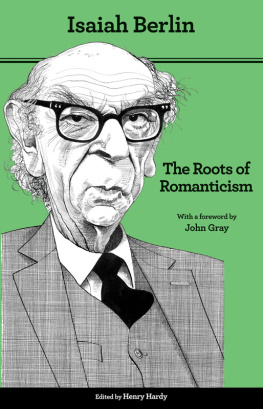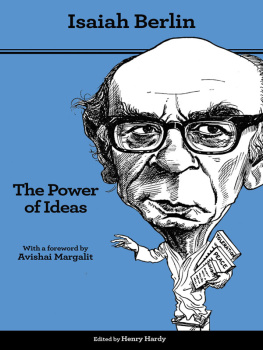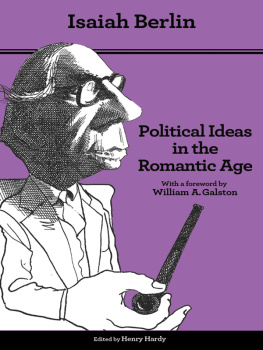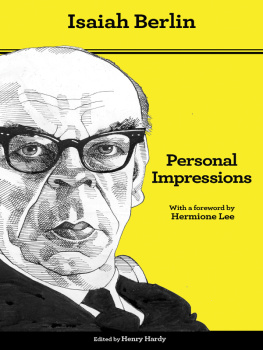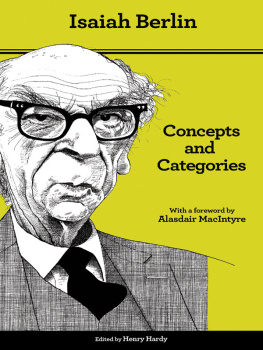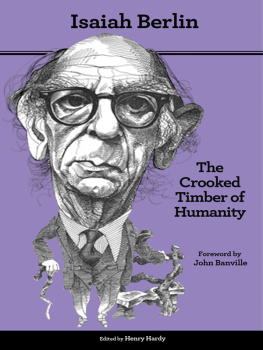
AGAINST THE CURRENT
ISAIAH BERLIN WAS BORN IN RIGA, now capital of Latvia, in 1909. When he was six, his family moved to Russia; there in 1917, in Petrograd, he witnessed both Revolutions Social Democratic and Bolshevik. In 1921 his family came to England, and he was educated at St Pauls School, London, and Corpus Christi College, Oxford.
At Oxford he was a Fellow of All Souls, a Fellow of New College, Professor of Social and Political Theory, and founding President of Wolfson College. He also held the Presidency of the British Academy. In addition to Against the Current, his main published works are Karl Marx, Russian Thinkers, Concepts and Categories, Personal Impressions, The Crooked Timber of Humanity, The Sense of Reality, The Proper Study of Mankind, The Roots of Romanticism, The Power of Ideas, Three Critics of the Enlightenment, Freedom and Its Betrayal, Liberty, The Soviet Mind and Political Ideas in the Romantic Age. As an exponent of the history of ideas he was awarded the Erasmus, Lippincott and Agnelli Prizes; he also received the Jerusalem Prize for his lifelong defence of civil liberties. He died in 1997.
Henry Hardy, a Fellow of Wolfson College, Oxford, is one of Isaiah Berlins Literary Trustees. He has edited (or co-edited) many other books by Berlin, including the first three volumes of his letters, and is currently working on the remaining volume.
Roger Hausheer has taught at Oxford, Giessen and Bradford Universities, among others, and is currently a Visiting Professor in the Department of Political Science at the University of Montenegro at Podgorica. He is working on an intellectual biography of Isaiah Berlin, and a study of the German Idealist philosophers Fichte and Schelling.
Mark Lilla, Professor of Humanities at Columbia University, co-edited The Legacy of Isaiah Berlin (2001). His latest book is The Stillborn God: Religion, Politics, and the Modern West (2007).
For further information about Isaiah Berlin visit
ALSO BY ISAIAH BERLIN
*
Karl Marx
The Hedgehog and the Fox
The Age of Enlightenment
Russian Thinkers
Concepts and Categories
Personal Impressions
The Crooked Timber of Humanity
The Sense of Reality
The Proper Study of Mankind
The Roots of Romanticism
The Power of Ideas
Three Critics of the Enlightenment
Freedom and Its Betrayal
Liberty
The Soviet Mind
Political Ideas in the Romantic Age
with Beata Polanowska-Sygulska
Unfinished Dialogue
*
Flourishing: Letters 19281946
Enlightening: Letters 19461960
Building: Letters 19601975
Published in the United States of America, its Colonies and Dependencies, the Philippine Islands, and Canada by Princeton University Press, 41 William Street, Princeton, New Jersey 08540
Requests for permission to reproduce material from this work should be sent to Permissions, Princeton University Press
press.princeton.edu
First published by the Hogarth Press 1979
First published in the US by the Viking Press 1980
Second edition published by Princeton University Press 2013
Copyright Isaiah Berlin 1955
Isaiah Berlin 1955, 1959, 1968, 1969, 1970, 1971, 1972, 1973, 1974, 1979, 2013
Letters by Isaiah Berlin The Isaiah Berlin Literary Trust 2013
Letter from David Cecil The Estate of Lord David Cecil 2013
Hume and the Sources of German Anti-Rationalism
Edinburgh University Press 1977
Vico and the Ideal of the Enlightenment Social Research 1979
Selection and editorial matter Henry Hardy 1979, 2013
Introduction Roger Hausheer 1979
Foreword Princeton University Press 2013
The moral right of Isaiah Berlin and Henry Hardy to be identified as the author and editor respectively of this work has been asserted
All Rights Reserved
Library of Congress Cataloging-in-Publication Data Berlin, Isaiah, 19091997.
Against the current : essays in the history of ideas / Isaiah Berlin; edited by Henry Hardy; introduction by Roger Hausheer; foreword by Mark Lilla. Second edition.
pages cm
Includes bibliographical references and index.
ISBN 978-0-691-15610-1 (pbk. : alk. paper)
1. Philosophy. I. Hardy, Henry. II. Title.
B29.B445 2013
109dc23
2012035153
British Library Cataloging-in-Publication Data is available
This book has been composed in Garamond Premier Pro
Printed on acid-free paper 
Printed in the United States of America
1 3 5 7 9 10 8 6 4 2
For Martine and Peter Halban
CONTENTS
by Mark Lilla |
by Roger Hausheer |
FOREWORD
Mark Lilla
To one who thinks philosophically, no story is a matter of indifference, even if it were the natural history of the apes.
H. M. G. Kster
IT WAS AN ANECDOTE HE liked to tell. In 1944, while working at the British Embassy in Washington, DC, Isaiah Berlin was called back to London at short notice, and it happened that the only plane available to take him was a loud, uncomfortable military bomber. Because the cabin wasnt pressurised he had to wear an oxygen mask that kept him from speaking, and there were no lights either, so he couldnt read. It was a long flight. He joked afterwards, One was therefore reduced to a most terrible thing to having to think.
While airborne, the story went, he had a small epiphany. In the 1930s he had taught philosophy at Oxford, happily, with his like-minded friends Stuart Hampshire, J. L. Austin and A. J. Ayer. Logical positivism had just come into its own in Britain, and Wittgenstein was already developing ideas about language that would challenge it. Something seemed to be happening. When the war was over he gave up his philosophy fellowship and started calling himself a historian of ideas.
Its a very good story. Ive often wished, though, that he hadnt told it. Berlins account of his decision baffled friends and colleagues back at Oxford, and left the impression that he had taken a step down the intellectual ladder. It occurred to no one at the time that moving to the history of ideas might actually represent a step up. Philosophy was philosophy, history was history, and that was that. No one in Britain called himself a historian of ideas, and no one wrote the kind of wide-ranging, labyrinthine essays connecting thinkers over many centuries that Berlin perfected. The dons could make nothing of them and considered him a dilettante. Berlin was too urbane to defend himself or engage in dull debates about methodology, and bore their contempt with the irony of a gentleman. (At least in public. In conversation and letters he gave as good as he got.)
When one rereads Against the Current, his collection of essays and portraits in the history of ideas published over thirty years ago, its hard to understand how so many missed what is obvious on every page: that Isaiah Berlin never abandoned philosophy. The topics he addressed in the book are ones philosophers have occupied themselves with for millennia: the extent and limits of reason, the nature of language, the role of the imagination, the foundation of morality, the concept of justice, the conflicting claims of citizenship and community, the meaning of history. But he reasoned about them in a manner adapted to his particular interests and abilities. When analytic philosophers look to past thinkers at all, they try to extract arguments they can express in terms they themselves typically use. Their assumption is that philosophy cannot happen until ideas sprout wings and escape the body, like the souls in Platos
Next page
